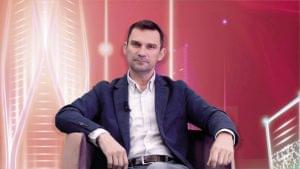Magazine: There aren’t any futureproof success recipes or responses
In the latest Future Talks podcast episode Szilvia Krizsó talked to Dr Imre Porkoláb, colonel, director of the Leadership Training Academy at Mathias Corvinus Collegium. The article features parts of the conversation that you can listen to at futuretalks.hu.
– What is the life of a career soldier like?
– Very well-regulated and quite predictable. But I’ve always been representing a non-traditional leadership style that I started to deal with after my return from Iraq in 2004.

Dr. Imre Porkoláb colonel, director of the Leadership Training Academy at Mathias Corvinus Collegium
– Is there room for any non-traditional approach and leadership in the army?
– Yes, but there’s no doubt, the command must always be executed. Still the world has turned in the past 150 years.
– In line with your futures research in Pentagon, help us, what should we expect in the next 30-40 years.
– If I had a crystal ball! What I see important, though, is to concentrate more on mapping all future options. Even in Pentagon, strategies are based on forecasts of the next seven years, as the development pace of technology fails to allow us to look ahead to 30-40 years.
– Is it true to enterprises, too?
– I find this seven-year approach realistic. But with a view to maintaining competitiveness in the long run, new elements like strategic agility and network building need to be added to the traditional planning process.
– When talking about network building, do you mean enterprises?
– Enterprises, too. But I can cite military examples as well. In Iraq, a top-secret Task Force carried out operations against al-Qaeda without breakthrough success as a result of poor cooperation. General Stanley McChrystal managed to multiply their power by changing a few leadership methods.
– Do you think that the current leaders need to develop in terms of self-knowledge?
– Without data I do not want to be guessing. I think, these days a leader had better use a tool-kit and consciously build a team with a view to be able to address every kind of challenge. There aren’t any futureproof success recipes, responses have to be A/B tested, which requires a novel approach and new methods.
– So, a lot depends on who we select into our team, right?
– Yes. Corporate selection is made along certain measurable skills, which are not enough in an unpredictable environment. The way a leader copes with their fears, communicates in emergency and is aware of a situation weighs more. And that is what army selection is aimed to explore, by pushing soldiers to the limits of their performance and a little beyond.
– How do you cope with stress and burnout?
– Practice beyond our comfort zone like a Spartan race can work as a sort of ‘vaccination’ against stress. If well-timed and in a small amount, stress can incredibly boost performance. True, though, that active regeneration also underlies coping with stress.

Dr. Imre Porkoláb : „If well-timed and in a small amount, stress – no matter how much demonized – can incredibly boost performance”
– What did you learn about yourself in Iraq and Afghanistan?
– Now, I appreciate the little things in life even more than before. Working in a coalition, I realised how important it is that different cultures are in harmony and that a coalition, if established, must be constantly monitored and deployed in favour of our mission. This is what shapes my way of thinking also now, when I think in terms of ecosystems. //
Related news
(HU) Olyan MI kell, ami meg tud bennünket védeni – mondja a kibertitok jövőkutató
🎧 Hallgasd a cikket: Lejátszás Szünet Folytatás Leállítás Nyelv: Auto…
Read more >Related news
40 secure jobs, sustainable solutions – new BURGER KING® in Csepel
🎧 Hallgasd a cikket: Lejátszás Szünet Folytatás Leállítás Nyelv: Auto…
Read more >








